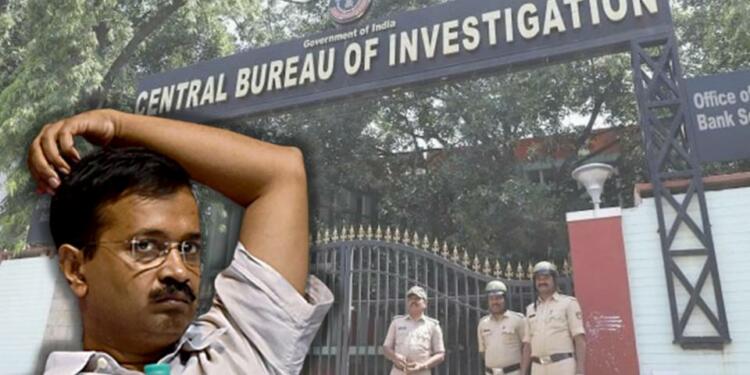To reiterate the leftists’ despair, the congress party has often experienced constant nagging for their practices. However, they have found a new friend running the same race: AAP leader and (sadly) the Delhi CM Arvind Kejriwal.
Indeed, the muffler man has created a lot of buzz around him, which extended its footprints to the CBI ambiance as well. From Delhi’s liquor policy to the new controversy of DTC’s buses, the Aam Admi Party and its members are once again under scrutiny.
Delhi government under suspicion
In a recent report, it was revealed that the Central Bureau of Investigation (CBI) has initiated a probe over allegations of corruption in the Delhi government’s deal of purchase and maintain of 1,000 DTC’s low-floor buses. According to The Indian Express, a preliminary enquiry has been initiated and the case is under investigation.
The probe against the corruption charges was followed after a 2021 letter by the Union Ministry of Home Affairs (MHA) suggesting a CBI investigation into a Delhi Transport Corporation deal related to the purchase and Annual Maintenance Contract (AMC) of 1,000 low-floor air-conditioned buses.
For the fulfilment of the same, a committee was formed by the then Lt Governor Anil Baijal, which further resulted few lapses. Moreover, Delhi government’s Former Additional Secretary, Govind Mohan, had highlighted the need for a preliminary inquiry by the central agency.
Amid the investigation being conducted, the Kejriwal government claims to have received a clear chit in the matter. However, the files of 2021 lodged complaints are still open.
Kejriwal’s freebie resulted in corruption
Free water, free power, free education, free health, free metro rides among others are leaflets of Arvind Kejriwal’s run Aam Aadmi Party. Through these freebies, it has time and again tried to lure the common masses in light to fulfil their corruption driven political agendas. And the recent case of DTC’s buses is an addition to it.
Concerning the corruption charges in low floor buses, it was seen that the purchase contract was for Rs. 850 crore and the 12-year Annual Maintenance Contract or AMC was for Rs. 3,412 crore. Additionally, the purchase tender was awarded to JBM Auto and Tata Motors on a 70:30 ratio respectively. While JBM Auto had also emerged as the L1 bidder in the AMC tendering.
Focusing on the dispute, it was noted that there were two separate tenders made by the DTC last year, for the purchase of 1,000 low-floor AC buses and their AMC. According to reports, the DTC had reasoned that a composite tender for both the purposes may not have attracted bidders. Hence, it decided to split the process.
However, the matter came under suspicion after the appointed three-member committee pointed out that the eligibility criteria in the AMC tender “defeated the purpose of splitting the bids.” The committee included Ashish Kundra, Principal Secretary (transport), K R Meena, Principal Secretary (vigilance), and former IAS OP Agarwal.
Read more: Delhi has 40697 crore debt, but Kejriwal unveils a 720 cr bus fare freebie
Further, the committee’s 11-page report observed that the AMC encourages “cartelisation” and “monopoly pricing”. Additionally, it underlined that it “focused its attention only on the procurement process of AMC of the buses”.
Amid all these looming cases of corruption, the Delhi government has denied all the allegations. In the wake of attacking BJP for curtailing their corrupted activities, the government said, “It is a politically motivated conspiracy against the Aam Aadmi Party.” Additionally, considering the repeated CBI’s probe, it has also said that “the Centre Government has tried to harass the Delhi Government using the CBI.”
However, the Delhi government is unable to realize that its own party members are not being able to handle their corruption driven activities. The same thing happened in the liquor policy controversy as well, which further dragged the party under scrutiny.
Liquor policy controversy
During the COVID 19 outbreak, when the entire country was shaken by the pandemic, the Delhi government passed the excise policy of 2021-22. To put it simply, the Delhi Government separated itself from the business of selling alcohol in the year 2021. This included shutting down of around 600 government run liquor shops. The idea was to revolutionise liquor shopping by making it more appealing and in the process boost the revenue.
Apart from this, an L-38 license was also introduced for banquet halls, party places, farmhouses, and Hotels. This permitted them to serve Indian and foreign liquor at all parties hosted on their premises.
Read more: With rollback on liquor policy, does Aam Aadmi Party have something to hide
Considering the repercussions of the Delhi government’s decision, the opposition criticised the move for promoting alcohol and making the youth directionless. Various other political parties also claimed that in the wake of promising more schools and development, the Delhi government is opening liquor stores.
Therefore, it is pertinent to note that it’s not the first time that Arvind Kejriwal led Aam Aadmi party is under scrutiny. Its long initiated programs and schemes are now being exposed with their true intention. The arresting of Satyendra Jain and Manish Sisodia was a repercussion of one such activity by the Delhi government.
To conclude, it is evident that the dirty closet of Arvind Kejriwal is gradually getting exposed and the time will be harder for him to sustain clean-slate.
Support TFI:
Support us to strengthen the ‘Right’ ideology of cultural nationalism by purchasing the best quality garments from TFI-STORE.COM
























